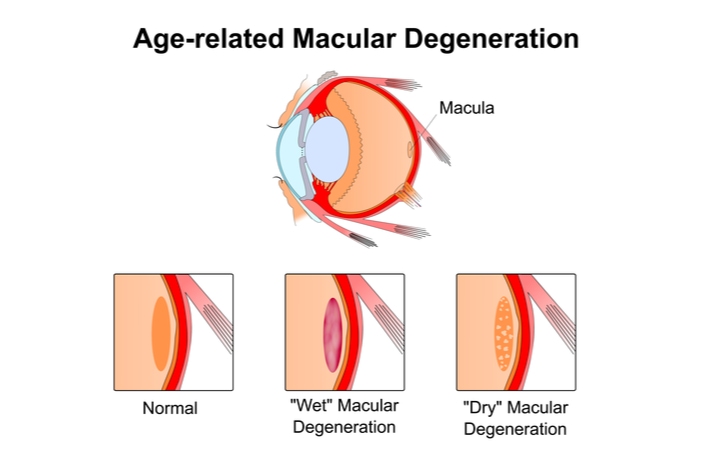Age-related macular degeneration (AMD) is a leading cause of vision loss in people over the age of 55. It’s a progressive eye disease that can lead to blindness if not treated. While the cause of macular degeneration is not yet known, some factors increase your risk of developing the disease.
One such factor is genetics – if you have a family history of macular degeneration, you are more likely to develop it yourself. Being aware of your risk factors and getting regular eye exams is the best way to monitor the earliest developments of macular generation.
Advance Eye Care Center is proud to offer advanced AMD testing to all of our patients. If you’re concerned about your risk for macular degeneration or are due for your annual eye exam, contact our office to schedule your next visit.
What is Macular Degeneration?
Macular degeneration (MD) is a disease that affects the macula, which is located in the center of the retina. The macula is responsible for providing sharp and clear vision. When macular degeneration occurs, it can cause blurred vision or a loss of central vision. This eye disease affects more than 1.5 million people in Canada, making macular degeneration the leading cause of blindness.
Also known as age-related macular degeneration (AMD), It’s common for this disease to affect one eye first and then the other. There are two types of AMD: wet macular degeneration and dry macular degeneration.
Dry AMD
This is the more common form of macular degeneration. It is caused by a breakdown or thinning of the macula’s light-sensitive cells. The changes can be very gradual and difficult to diagnose in the beginning. This type of macular degeneration usually affects both eyes, but it may start in one eye and then spread to the other.
Wet AMD
Wet AMD is less common but much more serious than dry AMD. Wet AMD occurs when new blood vessels grow abnormally under the retina. These new blood vessels can leak fluid and damage the macula, which can lead to rapid vision loss.
This form of macular degeneration accounts for about 10% of all cases. But it can progress quickly and can lead to permanent vision loss within one year after diagnosis.
Macular degeneration cannot be cured, but early detection and treatment can help slow its progression. A comprehensive dilated eye exam can detect signs of macular degeneration before any vision loss occurs. Make sure to see your optometrists regularly, especially if you’re over the age of 50.
Symptoms of AMD
The most common early sign of macular degeneration is that straight appear wavy in your vision. This symptom is called metamorphopsia. Other symptoms include:
- Gradual loss of central vision, which makes it difficult to read, drive or see faces clearly
- Blurred vision
- Difficulty recognizing colours
- Dark spots in your field of vision
- Increased sensitivity to light
- Poor night vision
Often with AMD, small yellow deposits, called drusen, grow beneath your retina. This doesn’t always mean you’ll develop AMD, but it can increase your risk over time as more drusen appear. Your eye doctor will examine for the presence of drusen during a comprehensive eye exam.
Macular Degeneration Risk Factors
The exact causes for both types of macular degeneration are unknown, but doctors believe certain factors make individuals more susceptible to this disease. These risk factors include:
- Age (people aged 50+ are more likely to develop age-related macular degeneration)
- Smoking
- Family history of the disease
- Intense UV exposure
- Genetics (Caucasians are more likely to develop AMD)
- High blood pressure
- Obesity
- Arteriosclerosis
Hereditary Factors & AMD
Individuals who have a family history of macular degeneration are more likely to develop the disease. Studies have also shown that genes may play a role in whether or not someone gets AMD. If you have parents with macular degeneration, you are twice as likely to develop the condition.
So the short answer is yes, macular degeneration is hereditary. You won’t necessarily develop the disease just because your parents have it. But it’s important for people at risk of developing AMD to get regular eye exams. This will help doctors catch any changes in the macula early and begin treatment if necessary.
You may want to talk to your eye doctor about getting tested even if you don’t exhibit any symptoms. Early detection is key in preventing vision loss from this disease.

The Importance of Early AMD Diagnosis
Early macular degeneration diagnosis is extremely important. Wet AMD can accelerate rapidly with significant consequences to your vision. Because macular degeneration damages the macula, which controls central vision, it can cause impairment in a person’s ability to perform routine daily tasks like reading, driving, and recognizing faces.
Genetic testing is another method that doctors use to gauge your macular degeneration risk level. If you are unsure about your family’s history of AMD, this process can help you understand your risk.
Advance Eye Care Center strives to diagnose the earliest signs of AMD with the AdaptDx diagnostic tool. AdaptDx testing accurately measures dark adaptation of your eyes, which can help identify AMD. Macular degeneration testing is part of every eye exam at Advance Eye Care Center.
Prevention & Treatment of AMD
Because macular degeneration is a progressive disease, there’s no cure for it. But there are ways to slow its progression and preserve your remaining vision. Wearing proper sun protection at all times is one of them. Healthy lifestyle choices, like regular exercise and avoiding cigarettes, can also help prevent AMD.
These treatments don’t work for everyone. And they won’t restore lost vision. But they can help prevent further loss of central vision.
Dietary Changes
Along with a commitment to lower your blood pressure, try updating your diet. Eating green leafy vegetables like kale and spinach may reduce the risk of macular degeneration. Reduce your intake of fatty foods and consume high levels of:
- Beta-carotene (vitamin A)
- Vitamin C
- Vitamin E
- Zinc
- Lutein
- Zeaxanthin
- Selenium
- Omega 3 fatty acids
Injected Medications
Wet AMD is sometimes treated with medication that’s injected directly into the eye. This stops blood vessels from further leaking. This treatment is more effective during the earliest stages of wet AMD.
Laser Surgery
Laser treatment can sometimes shrink abnormal blood vessels by burning away small areas of the retina. Unfortunately, the nature of this process can sometimes lead to blind spots or other vision loss.
Stay Aware, Stay Ahead
If you notice any changes in your vision or are at high risk for macular degeneration, schedule an eye exam for testing. Our doctors can help assess your macula health and begin treatment if necessary. In addition to regular eye exams, remember to eat a healthy diet and exercise regularly.Hereditary factors do play a role in your risks for developing AMD. Our diagnostic process at Advance Eye Care Center includes some of the leading technology in AMD testing. So do your eyes a favour and make sure eye diseases are being noticed before they take away your vision.



